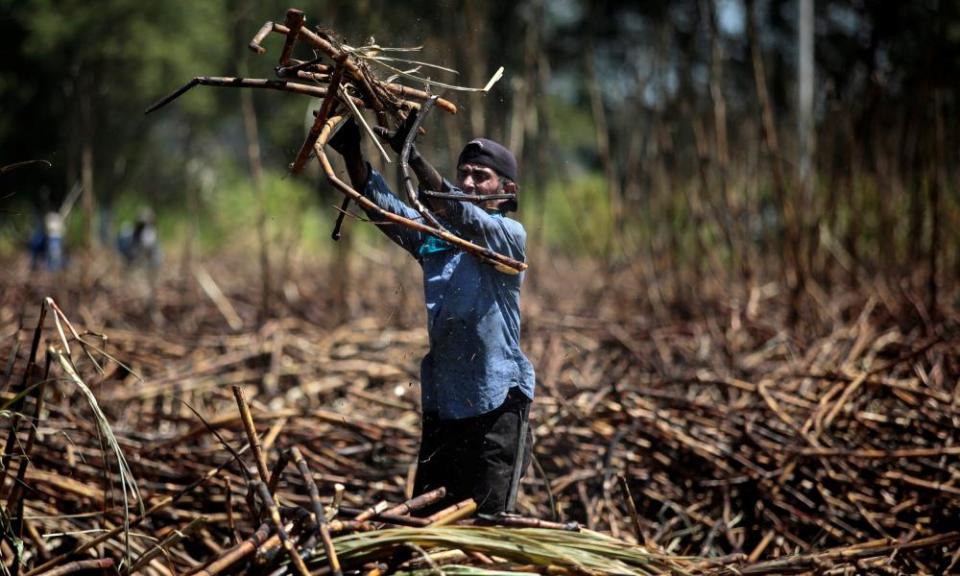‘You shouldn’t work if your kidneys are failing – but people can’t afford not to’

At the Sacuanjoche clinic in Chinandega, the largest city in Nicaragua’s sugar cane-growing region, nephrologist Nelson Garcia does the rounds of his patients. Many are suffering from chronic kidney disease (CKD); most fell ill while working long hours under the beating sun in the nearby sugar cane fields, and now have damaged and failing kidneys.
“People arrive with a host of symptoms here; some are really nauseous, or vomiting, or have severe diarrhoea,” Garcia says, adding that although unsure exactly how many people he has treated for heat stress and related kidney diseases this year, he knows it is a lot. “Others are physically weakened, tired, or have nasty muscular cramps, while others complain about having no appetite or libido – there really are so many symptoms.”
Such varied symptoms require varied treatments, and at the underfunded and basic clinic where Garcia works, that leads to chaotic shifts. “The response depends on the individual case,” says Garcia, who also works at two other hospitals in the region. “Some people don’t have the energy to walk 500 metres, whereas others have very mild symptoms. We see everything from people who can be treated at home to people who are very much emergency cases.”
The majority of Garcia’s patients have been exposed to heat stress while working in the region’s vast sugar cane fields in temperatures of up to 45C (113F). Despite the implementation in recent years of programmes of water, rest and shade breaks, many still find themselves suffering from CKD caused by heat stress.
“You shouldn’t work if your kidneys are failing; you shouldn’t risk dehydration, exposing yourself to high temperatures or straining yourself physically,” Garcia says. “But people can’t afford not to work, and some of the only work available around here is in the fields.”
Globally, more than 5 million people die each year due to excessively hot or cold conditions, according to a recent 20-year study, and heat-related deaths are climbing, while a 2019 report from the International Labour Organization (ILO) found that rising heat stress resulting from global heating is projected to lead to the equivalent of 80m full-time jobs being lost by 2030.
Climate change is already here and making these conditions worse. We need to learn to be prepared now
Cristhian Velásquez, La Isla Foundation
In Chinandega, agricultural workers – who have scant labour protection and usually come from poor families – see little option but to risk their health.
“People don’t want to accept they have kidney problems because they worry it will take them out of the workforce,” Garcia says. “So they avoid seeking medical attention, because they don’t want the diagnosis that could stop them working.”
Cynthia Rivera, a psychologist and trainee nurse working in Chichigalpa, a small town reliant on the sugar cane industry, says that as well as suffering from the physical symptoms of CKD, many patients also bear a psychological burden.
Related: Global heating ‘may lead to epidemic of kidney disease’
“The majority of people exhibit depressive or anxious characteristics because it’s very difficult for them to accept that they may no longer be able to provide for their families,” Rivera says, adding that many workers start families young, piling on the pressure to remain in the workforce. “Most people here working in the fields haven’t studied to work in anything else, and you see cases of extreme anxiety and depression.”

Many living in Chichigalpa know someone – usually a male breadwinner – who has died or suffered badly from CKD. In nearby La Isla, the death toll has been so great the village is now known as La Isla de Viudas, or the Island of Widows.
“As a citizen and a former worker at the sugar mill, I’ve seen first-hand the extreme heat that workers are exposed to, and it’s usually young people that take on this work,” says Cristhian Velásquez, the president of La Isla Foundation, a local NGO that works to improve agricultural labour conditions and support workers suffering from CKD.
Velásquez added that while gains have been made in Nicaragua’s sugar cane industry, with water, rest and shade available to workers, the climate emergency has made better work practices more urgent, both in Nicaragua and abroad. “Climate change is already here and already making these conditions worse,” Velásquez says. “We need to learn to be prepared now.”

 Yahoo Finance
Yahoo Finance 